advertisement
The following post is from Christy of Eclectic Momma:
Check
Checkmate
Pins, gambits, openings…
Any non-chess playing parents out there?
Chess has become a big deal in our house. As a parent, who didn’t even know the rules of chess, it was quite overwhelming when my kids first learned to play and compete. I have since embraced the title, “Chess Mom” and wear that title proudly. I’ve learned quite a bit through our transition from beginner players to tournament play.
advertisement
Some benefits of chess for children:
- social interaction with peers
- helps with focus and concentration
- reinforces mathematical concepts such as visualization, calculation, logic and spatial reasoning
- teaches decision-making skills and consequences of their decisions
- teaches one-on-one competition skills and good sportsmanship
How to teach your child to play chess:
Most children learn how to play chess from their parents, but if you don’t know how to play (I didn’t), don’t be discouraged. There are other ways to teach your child to play:
No Stress Chess – Great board game that helps the beginning player get started with hints and suggested moves.
ChessKids.com – Chesskids.com is a great free website (with optional paid membership for additional resources) that allows players to play live chess with another member, play the computer or learn how to play with various tutorials, puzzles and videos.
Books from your local library
Find a chess club near you – The best way to encourage your child to learn/play chess is to get involved in a local chess club or after school program. This has been an invaluable resource for our family.
My children have met a wide variety of adults and peers all wanting to participate in something that excites them. The mentor relationships they have formed will impact them for a lifetime.
Concerns for parents of beginning chess players to remember:
- Don’t force a child to play that obviously dislikes the game.
- Even if you don’t play, be familiar with basic chess terminology. Trust me, your kids will want to talk to you about their new found love of the game.
- Glossary of chess terms
There are certain chess etiquette “rules” that should be observed by beginner players:
- Make sure the board is set up the right way. The white square in the corner of the board is always to your right. The queen goes on her color. (If you are playing white, the queen goes on the white square.)
- Before playing, introduce yourself to your opponent.
- Touch move–If your child touches a piece, they have to move that piece on that turn.
- Don’t play with pieces during play.
- Exhibit good sportsmanship! Do not allow your child to talk negatively about their opponent, gloat if they win or pout if they lose.
- After the game has ended, shake hands with your opponent no matter the outcome and say, “Good game!”
Transition to Tournament Chess Play:
After your child has played for a while, it’s quite common to transition into playing at tournaments.
Find local tournaments by state.
Serious players are going to want/need certain tools at the tournament level:
- Tournament set– This is a special set that “meets the World Chess Federation’s (FIDE) height weight and proportions standards for tournament play.” Not just any set you have around the house or themed sets.
- Score sheet or book to record their moves– Sometimes these are provided at the tournament or can be bought for under $5 from the USCF site
- Chess clock– We purchased one for our son for under $50. Be sure to always read reviews before purchasing.
- Mentor/coach-As a non-playing parent, you need someone that has a chess rating a few hundreds point higher than your child’s rating. A rating is simply a score (based upon a really complicated math formula) you receive as a USCF member when you play in tournaments. Your wins, losses and opponents all factor into your rating.
- USCF membership– It’s possible to compete at the tournament level and not join USCF or have a rating. BUT I have learned it’s IMPORTANT. My kids pay attention to their rating, it matters a lot to them.
Website resources for training and online chess:
- Chess Tempo
- Chess.com Our favorite chess website!
- Chess Cafe
Concerns for parents at the tournament level:
- Dealing with loss (or winning) Prepare your child for loss! Emphasize good sportsmanship. Love and encourage them because in the end—it’s just a game! NEVER berate your child over a loss! Celebrate either way! This article by David MacEnulty, chess coach—read it!
- Teaching your child to use a clock and time management. At tournaments games are timed, so having a clock and practicing ahead of time is important.
- All rules from the beginning level apply to tournament play as well.
- Parent etiquette- Don’t argue with a tournament director! Don’t hover over a game! Don’t interfere with a game or cheat! If you have an issue, go to the tournament director and speak privately. Be nice! Model good sportsmanship!
Chess is an awesome game teaching skills that will impact other areas of life. Even if you don’t know the names of the pieces, let your child experience the thrilling world of chess!
 |
Christy blogs about life and homeschooling at Eclectic Momma. You can also follow her on Facebook, Pinterest, and Twitter. |
Join 40,000+ Other Awesome People
Subscribe to the Real Life at Home weekly newsletter to get our latest content, exclusive free printables, learning activities, and ideas for celebrating with your kids all year
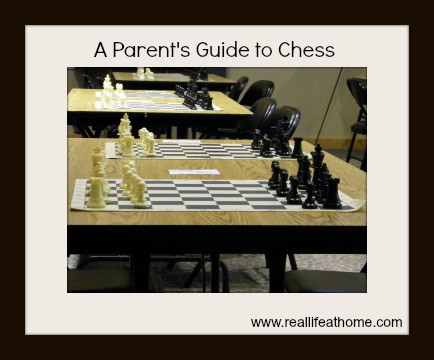
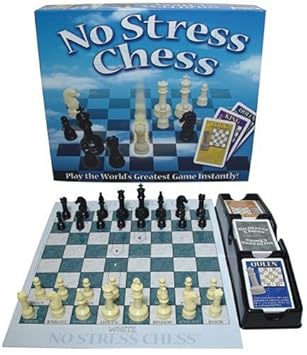
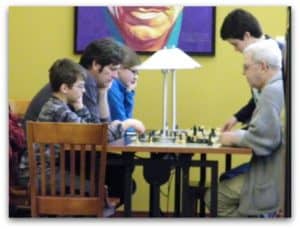
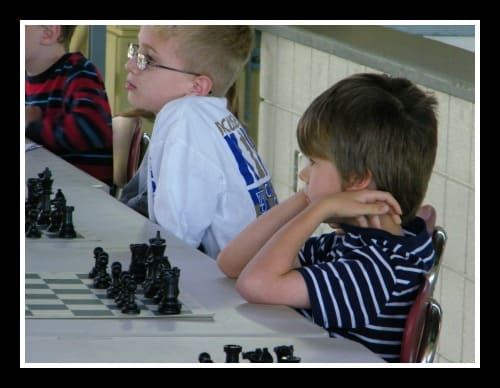
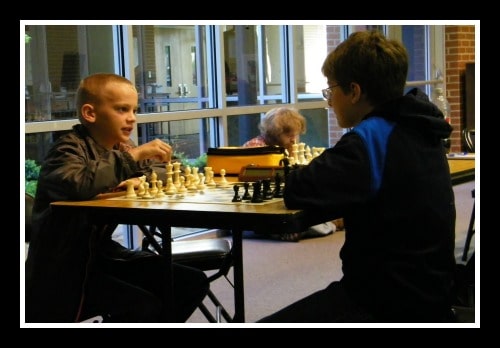
Leave a Reply